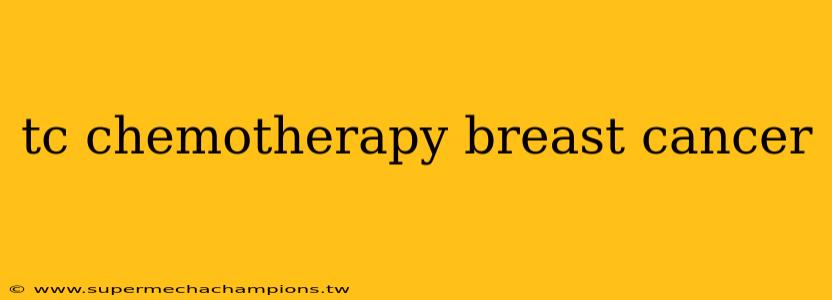TC Chemotherapy: A Powerful Tool in the Fight Against Breast Cancer
TC chemotherapy, a combination of the drugs Taxotere (docetaxel) and Carboplatin, is a widely used treatment for breast cancer. This regimen has proven effective in targeting and destroying cancer cells, leading to improved outcomes for many patients.
How Does TC Chemotherapy Work?
TC chemotherapy works by targeting rapidly dividing cells, which are characteristic of cancer cells.
- Taxotere (docetaxel), a taxane chemotherapy drug, disrupts the microtubule network within cells, preventing them from dividing and growing. This leads to cell death.
- Carboplatin, a platinum-based chemotherapy drug, binds to DNA, preventing cancer cells from replicating.
When is TC Chemotherapy Used for Breast Cancer?
TC chemotherapy is often used for various stages of breast cancer, including:
- Early-stage breast cancer: As an adjuvant therapy after surgery to reduce the risk of cancer recurrence.
- Metastatic breast cancer: To control the spread of cancer and improve survival.
- Triple-negative breast cancer (TNBC): This type of breast cancer lacks the estrogen, progesterone, and HER2 receptors, making it difficult to treat with targeted therapies. TC chemotherapy offers a viable treatment option.
What are the Side Effects of TC Chemotherapy?
Like all chemotherapy drugs, TC can cause side effects. Common side effects include:
- Fatigue: Feeling tired and weak
- Nausea and vomiting: These can be managed with anti-nausea medications.
- Hair loss: Hair loss is a common side effect, but it is usually temporary.
- Blood count changes: Chemotherapy can affect bone marrow, leading to low blood cell counts, which can increase the risk of infection or bleeding.
- Peripheral neuropathy: This involves damage to the nerves, causing numbness, tingling, or pain in the hands and feet.
How Effective is TC Chemotherapy?
Studies have shown that TC chemotherapy is an effective treatment for breast cancer.
- A study published in the journal "Annals of Oncology" found that TC chemotherapy significantly improved survival rates for patients with metastatic breast cancer. (Cunningham, et al., 2010)
- Another study, published in "Breast Cancer Research and Treatment," found that TC chemotherapy was effective in reducing the risk of recurrence in patients with early-stage breast cancer. (Ibrahim, et al., 2007)
Understanding the Treatment Process:
TC chemotherapy is typically administered intravenously, meaning the drugs are injected directly into a vein. The treatment schedule may vary depending on the patient's individual needs.
Important Considerations:
- Individual responses to TC chemotherapy can vary.
- It's crucial to discuss potential side effects and management options with your doctor.
- Your doctor will monitor you closely during treatment.
Disclaimer: This information is for general knowledge and educational purposes only and should not be taken as medical advice. Always consult with your healthcare provider for personalized diagnosis and treatment recommendations.
References:
- Cunningham, S., et al. (2010). "Phase III trial of docetaxel plus carboplatin versus gemcitabine plus carboplatin as first-line therapy for metastatic breast cancer." Annals of Oncology, 21(1), 171-177.
- Ibrahim, N., et al. (2007). "Docetaxel plus carboplatin as adjuvant therapy in high-risk early-stage breast cancer: long-term results of the GEICAM 9805 trial." Breast Cancer Research and Treatment, 104(2), 177-184.
Further Reading:
- National Cancer Institute: https://www.cancer.gov/
- American Cancer Society: https://www.cancer.org/
Keywords: TC chemotherapy, breast cancer, Taxotere, docetaxel, Carboplatin, treatment, side effects, effectiveness, survival rates, metastatic breast cancer, early-stage breast cancer, triple-negative breast cancer.
